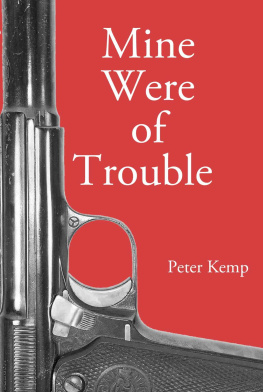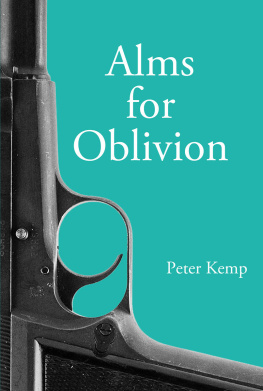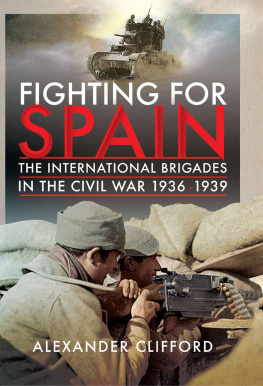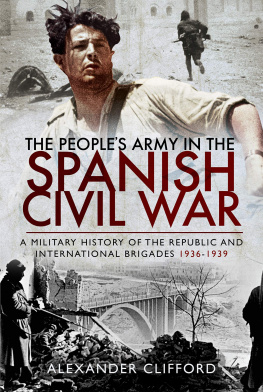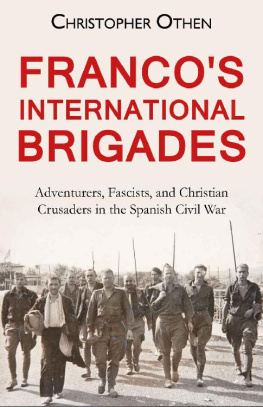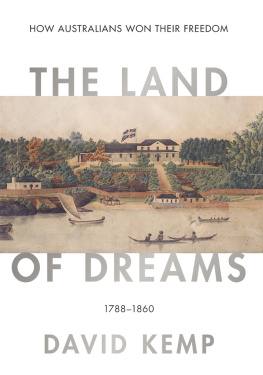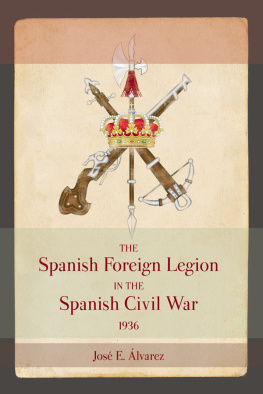Mine Were
of Trouble
Peter Kemp
Copyright 1957 Peter Kemp
All rights reserved.
ISBN: 9798624731721
v. 5
First paperback edition by Mystery Grove Publishing Co. LLC
TO CYNTHIA
The thoughts of others
Were light and fleeting,
Of lovers meeting
Or luck or fame.
Mine were of trouble....
A. E. Housman
In having thus complied with your wishes I only hope that your sons will support if necessary with their lives our present glorious Constitution both in Church and State, love their king and hate all republics and republicans.
Letter from Nelson to Revd Mr Priestly,
8 March 1801
NOTE FROM THE PUBLISHER
First published in 1957, Mine Were of Trouble is British soldier Peter Kemps account of his service during the Spanish Civil War. With a classical journalists eye for detail, Kemp offers a candid and remarkably impartial look at this often misunderstood conflict from the ground level, providing both a comprehensive overview of the war and its causes as well as thrilling descriptions of combat from the front lines. Adding to the books significance is that it is one of only a very few English accounts of the Spanish Civil War from the Nationalist perspective. Rewarding for both pleasure readers and scholars alike, Mine Were of Trouble is essential for anyone looking for a comprehensive understanding of this tumultuous period in European history.
Despite the books enormous value it was sadly out-of-print more than 60 years, with what few used copies remain prohibitively expensive to the average person. Mystery Grove Publishing Company is happy and proud to make this classic available for the first time ever in paperback and ebook form, allowing Kemps work to be enjoyed by a new generation of readers.
Please note, although weve attempted to recreate Kemps original work, there were several minor maps and diagrams in the 1st edition which would have been too costly to reproduce in this reprint and while still keeping prices low. These will be available for free on our Twitter account, @MysteryGrove.
We are very grateful for the enthusiasm with which our first release: The Storm of Steel: Original 1929 Translation, written by Ernst Jnger and translated by Basil Creighton, was received. We hope make similar lost or rare titles available to a wide audience in the near future. Please follow us on Twitter for information about our upcoming releases and other news.
Thank you for reading!
Special acknowledgement goes to the men of the HWGC and CL, without whose support and friendship these releases would not be possible.
TABLE OF CONTENTS
It is hard now to recall the atmosphere of 1936. When I came down from Cambridge in June of that year the pattern of European politics was confused and obscure. The foundations of peace seemed in danger of collapse, but as yet few were convinced that another World War was inevitable, or could foresee the alignment of the Powers if it should happen. The bewilderment of the peoples of Europe was reflected in the mistakes and hesitations of their rulers.
Hitler had achieved supreme power in Germany, but the full horrors and dangers of his rule were not universally apparent; indeed, he was often applauded in Germany and outside for cleaning up the mess of the Weimar Republic and for his suppression of Communism. But the recreation of the Wehrmacht, Germanys withdrawal from the League of Nations and her military occupation of the Rhineland gave warning of what was to come.
In a France weakened by a succession of shortlived and ineffective governments and resentful that victory in 1918 had brought neither security nor stability, the German occupation of the Rhineland induced a shock of indignation and protest. Monsieur Flandin, taken by surprise, was unable to act with the necessary decision. Having approached the British Government for assurances that Britain would support French military action against the German coup and being unable to obtain them, he acquiesced in a situation which all Frenchmen deplored, and of which most were terrified. The national disapproval was reflected in the subsequent elections, which returned to power a Front Populaire government under the nominal leadership of Monsieur Lon Blum, but with powerful, though less obvious, Communist affiliations. The national unity welded by German action was succeeded by anger and disintegration, by strikes and mass demonstrations in which supporters of the Front Populaire clashed bloodily with Anciens Combatants, Action Francaise and Croix-de-Feu. The general opinion in England was that the French are at loggerheads.
The Italian people, elated by their success in Abyssinia in the face of British and French opposition, were embittered rather than discouraged by the policy of Sanctions. They become progressively and aggressively anti-British and increasingly truculent towards their French and Balkan neighbors. The Axis was being forged.
In South-eastern Europe Jugoslavia, plunged into crisis two years earlier by the murder of King Alexander, was continually disturbed by further Ustashi and I.M.R.O. activities. The former were fomented by Italy, the latter by Bulgaria. Throughout the country Croats, Macedonians and Mussulmans were reacting against the dominance of Serbia. Albania was ruled by King Ahmed Zogu with Italian financial and economic aid. In October of 1935 King George of Greece had been restored to his throne by a plebiscite of his people.
Russian policy had been radically altered by two important events a couple of years earlier: in internal affairs the murder of Kirov in Leningrad on December 1st, 1934, put an end to all hopes that Stalin might follow a more liberal policy; there ensued a merciless repression, beginning with the trial and execution of Zinoviev and Kamenev and culminating in the virtual elimination of the Bolshevik Old Guard in the great purges of 1936-38. In the words of Greta Garbo in the film, Ninotchka, there would be fewer, and better, Russians. The other event, which had a vital effect on Soviet foreign policy and on Communist activity throughout Europe, was the inauguration, at the Seventh Congress of the Komintern in 1934, of the doctrine of the Popular Front. In the future, Communists abroad were to combine with all partiesSocialist, Liberal, Radical and even Conservativewho would join them in a Popular Front for Peace and against Fascism.
The control of the various Popular Fronts was to be in the firm but unobtrusive hands of the Communists. Within the next two years Popular Front governments were established in France and Spain.
The Spanish monarchy had fallen five years before in April, 1931, when King Alfonso XIII went into voluntary exile to avoid the risk of civil war; shortly afterwards Don Niceto Alcal Zamora became President of the Spanish Republic, with Don Manuel Azaa as Prime Minister. A Socialist government controlled the country for the next two years. Its rule was interrupted briefly by an attempted coup d'tat on August 10th, 1932, led by General Sanjurjo, the Lion of Morocco, which was quickly suppressed. Sanjurjo had commanded the Guardia Civil in 1931 and by his defeatist attitude had precipitated the departure of King Alfonso; now he declared for the King, but was captured and sentenced to death, reprieved at the last moment by Azaa and sent to prison in Spanish West Africa.
In 1933 the Socialist government was superseded by a coalition of right-wing parties under the leadership of Seor Gil Robles. In 1934 the parties of the left attempted armed revolution, which broke into civil war in Asturias among the inflammable miners of that province. After heavy fighting this revolt was suppressed, the instigators being treated with leniency. A succession of right-wing Governments continued until the elections of February 1936, which put a Popular Front government into power, with Seor Casares Quiroga as Prime Minister.
Next page
